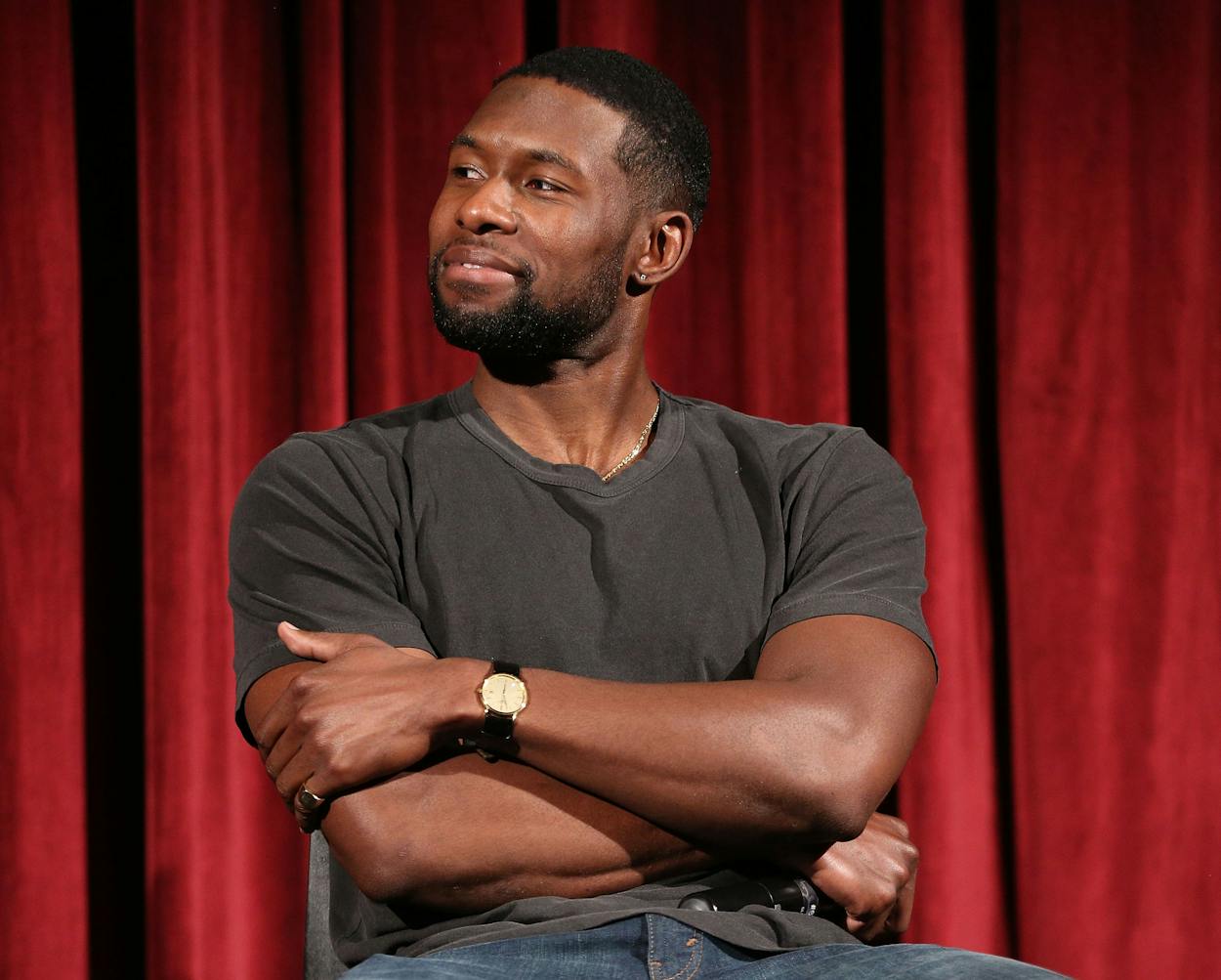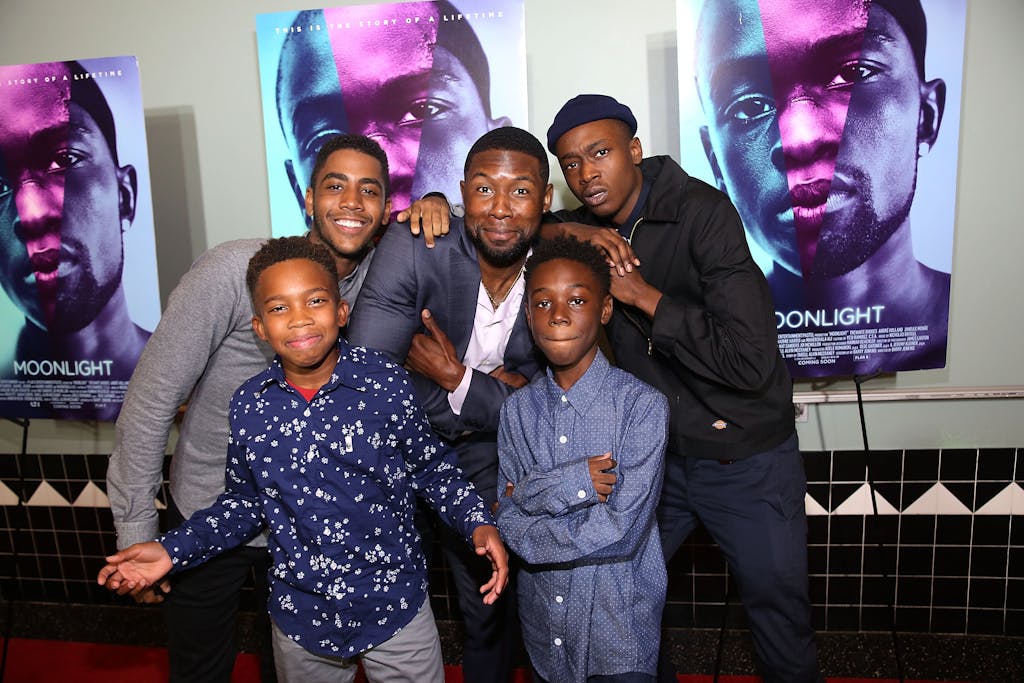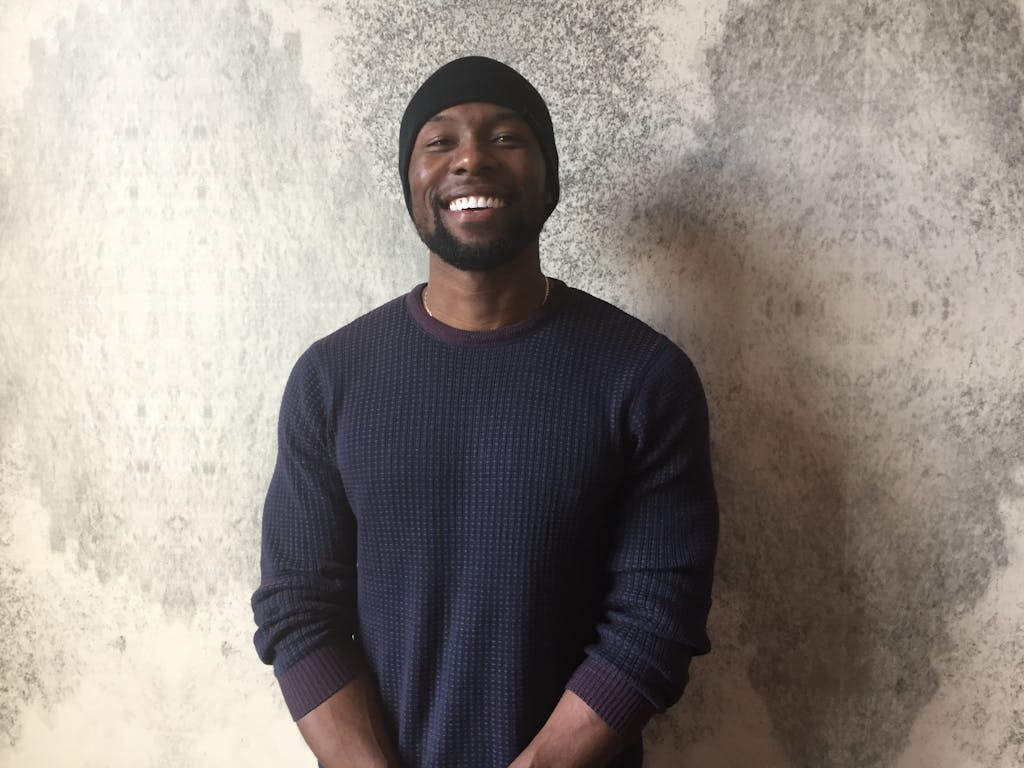Trevante Rhodes was “discovered” while jogging around the University of Texas at Austin’s campus. Rhodes, a native of Little Elm in North Dallas, came to Austin in 2008 to study corporate communications with the hopes of becoming a petroleum landman. But during his senior year at UT, where he ran for the Longhorn track and field team, he was stopped during a jog and invited to audition for an acting role. He didn’t land it, but he was hooked. Deciding to put his corporate plans on hold for a little bit to give acting a shot, Rhodes moved to Los Angeles months after graduating in 2012.
His time in LA has been a testament to his determination and talent. Rhodes landed roles in Tyler Perry’s OWN series, If Loving You Is Wrong, and HBO’s Westworld. But according to Rhodes, his latest project, Moonlight, really made acting click for him. The film beautifully explores themes of love, sexuality, and masculinity in a ways that projects with all-black casts rarely get to. The film is based on In Moonlight Black Boys Look Blue, a play written by Tarell McCraney and adapted by the film’s writer and director Barry Jenkins. It’s semi-autobiographical, drawing from the overlapping experiences of McCarney and Jenkins as young black men who coincidentally grew up blocks from each other in Miami without ever knowing it. In Moonlight, we follow the growth of Chiron, witnessing scenes from three pivotal stages of his life: childhood, adolescence, and adulthood. As adult Chiron, Rhodes effortlessly taps into the heart of the character’s vulnerability, an experience that has changed his career forever.
*This interview has been edited for clarity.
Doyin Oyeniyi: What was that transition like moving from Austin to LA? What projects did you first get involved in when you were out there?
Trevante Rhodes: For me, I coin Austin as being kind of a baby brother to LA. Because it’s pretty much the same thing, LA is just amplified to the nth degree. Since I had been interning at this oil and gas company for so long, I told myself I would give myself two years in LA to kind of get situated. If I book something then this is what I’m supposed to be doing. But if not, I move back because I already have these roots that are sown so deep. Within my second month of being in LA, I booked my first audition. It was like a co-star on a show called Gang Related. I got cut out of it. It was a unique thing because my mom was so proud, obviously. She’s on Facebook blasting it, “Oh, my baby’s gonna be on this show!” And this show airs and all you see is my dead body, because the whole scene had been cut. She was like, “that’s it?” But I booked that within the first two months, and every three months, I would book some small thing.
DO: So that kept you going in LA?
TR: It kept me enticed and it kept me trying to figure out what was going on and trying to figure out what this craft was. It wasn’t what I thought initially.
DO: You mean acting?
TR: Yeah. At least up until Moonlight, specifically. I had booked a soap opera with Tyler Perry, and I had that experience and it wasn’t as fulfilling as I thought. And then you get the opportunity to be part of Moonlight, which is so progressive, I believe. It’s something that matters. Then I understood that this sensation I’m feeling is what this is supposed to be. This is my contribution to the world.
DO: So how did you come across Moonlight, and what was that process like of connecting to that character?
TR: It was insane. It was a typical audition process. I got an email from my manager and she also called me. At that point in my career, whenever she would call, either I booked a role or this is something special. I was at the gym and she called me and she was like, “Stop whatever you’re doing, I know you’re working out right now, stop it, stop it, stop it! Go read this script because it’s incredible.” And I did and it was legitimately the best thing that I had ever read. You saw the blood, sweat, and tears that Barry Jenkins—our writer and director—put into the script and you saw how personal it was to him. So it became so personal to me. Initially I went in for the role of Kevin, the role André Holland plays, but for whatever reason, I gravitated towards Chiron. And if you ask Barry, he’ll tell you that I auditioned for Chiron while saying Kevin’s words. I saw everything about this person, literally in the script and stuff that wasn’t in the script. I had my barber carve a scar on the back of my head, because for whatever reason I though that Chiron should have this scar from this one time that Naomie Harris—Paula, his mother in the film—threw a bottle at the back of his head because he wouldn’t give her five dollars for her next fix. That wasn’t in the script, you saw these things. And the fact that this vision of this person was so vivid to me and I had felt these same emotions throughout my life in a different context, I felt these emotions and I felt them as I was reading the script.
DO: I’m thinking of the moment when I realized I needed to see Moonlight. It’s from the trailer. It’s from the very first scene in the trailer when your character’s riding in the car with Kevin and he looks over at him.
TR: That’s my favorite!
DO: And I thought, who is this man? There was so much vulnerability in that scene alone. How were you able to tap into that and convey that vulnerability without even saying anything really?
TR: To be honest, I wish I had some eloquent way of describing how I embodied this person. I mean, I can tell you the process that I had in order to kind of really find Chiron. It was really just about walking around LA feeling this scene of disdain toward everyone that I come into contact with because I didn’t love myself. You don’t have the capability of loving others if you don’t love yourself. I would see little kids, I would see these families walking around happy and I would hate them because they were happy and I couldn’t find that happiness. And I felt like I couldn’t connect with anyone. Normally I’m this person that loves to connect with people. I wave to people whenever I pass them on the street, which in LA is just unique because…
DO: It’s a Texas thing.
TR: Yes, it’s a Texas thing, but in LA people just think you’re crazy in doing that because LA people are mean. So I just embodied this completely different person and just walking around in this skin and carried that into the film, at least externally. Internally, I couldn’t even describe. Fortifying yourself in that way just kind of chemically changes you in a sense. And understanding the levity of these moments that this person has with these people—his mother, his love interest—you just embody that. Putting on that skin, you’re going to act a certain way, you’re going to feel a certain way whenever you look at somebody that you love, whenever it’s an awkward situation. Obviously, you can never not be yourself, so he is me, but it’s like that extension of me is just so different.
DO: At the screening in Austin, you said that you hadn’t been able to see the younger actors work. That blew me away because there were so many similarities between how you, Alex Hibbert, and Ashton Sanders portrayed this one character at different points in his life. So what were you able to draw on? Because I also saw characteristics of the Juan character, who influenced Chiron so much growing up, in the last chapter of Chiron’s life. He’s replicating him to a certain degree. So were you able to tap into Mahershala Ali’s portrayal of Juan?
TR: Mahershala’s character, in particular, was so instilled in the script and the person because it was so descriptive. It was apparent Chiron he was trying to embody what he saw as success in Juan. But in regard to the cohesiveness of the three characters who played Chiron, I have no idea. That’s the magic: casting. Incredible casting by Yesi Ramirez and Barry for just identifying this one thing that we all have in common within our facial features and just the essence of the character. The casting process wasn’t some long year-after-year thing to find these people who have this cohesiveness within them. Like I said before, in the script, there are certain things that let you know who this person is and as an actor you conceptualize these things and portray them the best you can. But it was just a great job in casting. That’s the only way I can make sense of it to be honest.
DO: So when you finally did see the movie complete for the first time, what was that like for you to see how they all tied together?
TR: It was freaky. The “Little” version, Alex Hibbert, I wish I could show you a picture of me at that age—maybe a little younger that he is now, because he’s a little small for his age—we looked the same. He’s a little darker than me and his nose is a little different, but it was like watching a reincarnation of my thoughts of myself whenever I would look at myself in the mirror. Even the second stage, Ashton, we don’t look alike at all, but I had that kind of skinny face. It was weird. I had the luxury of being the last bit, so by the time it gets to that, I’m already invested in the film and its like, “Oh, I am in the film, OK cool.” So its just unique watching that whole thing. It was insane.
DO: I think that’s also conveyed in the movie poster. All your faces spliced together and it’s all different faces, but it makes a whole character.
TR: Yeah, the eyes are the same. That poster is the best poster I’ve ever seen in my life. Insane. I hope somebody does a painting of it for me.
DO: Did the fact that the movie was semi-autobiographical add to the importance or the weight of carrying this character?
TR: Yes and no. I couldn’t focus on that because then you put added pressure onto yourself. That’s never a good thing. But in prep, you know the weight of everything. You gather all the pieces and you say, “Alright, this is important because this is this man’s life and I want to do as much justice to this person as I can and I want to contribute in the most beautiful way that I can.” Again, this is the reincarnation of this person’s life and obviously they’re going to see it because they’re working with you on it, but then when you get into the space, you literally have to just think what this person is thinking. I didn’t feel the weight, but I felt the honor, in a sense. He had picked me to help tell his life story. Incredible.
DO: Chiron is a gay man. Did you have any feelings or hesitations about portraying a gay character?
TR: Nah. It’s a human story. I say often—apparently this is the most prominent thing that I’ve ever said, because it’s all over everywhere—but I could have been born a gay man and I’d be the same guy. I was just born loving women. But I could have easily been born loving men and I would have been the same person, I would behave the same way. So why would I approach the work any differently?
DO: Is there any added pressure to do justice to an identity that you don’t identify with?
TR: One of my best friends since I was eleven-years-old is a gay man, and I knew his struggle. It was a tough life, you not accepting yourself. So that was something that really spoke to me about everything in the sense that I really wanted to make him proud. I didn’t want to dedicate it to him or anything like that. I didn’t do the film because of him, I did it because it’s a great film. But I knew that he would watch it one day and I knew that he would be proud that I contributed to trying to push the conversation forward. I definitely wanted to make him proud.
DO: I think you did, just saying.
TR: Yeah, he saw the movie when we were in Dallas the other day. And he cried and everything and he was like, “Bro, thank you so much, man.” And it was genuine. And I really hate speaking about him because then it becomes a thing like, “He did the film because of his gay friend!” No, that’s dumb. But that just so happened to be a part of my life. But yeah, he was proud and that made me really happy.
DO: So what’s next for you after this life-changing role? What kind of projects do you want to do in the future now?
TR: Socially-progressive films. One million percent. That’s the best part about what we get to do. The main thing that I learned in doing Moonlight is that we get to shine light on a way of living, or a person, or whatever it may be that otherwise wouldn’t have light or that otherwise wouldn’t have any exposure, so people have no idea. I got a Twitter direct message the other day from a white dude who was like, “Man, I’m a straight white man, but I had to reach out to you and let you know that I had no idea people like that even existed.”
TM: People like what?
TR: That’s what it said, “people like that existed,” but it was like “thank you for your contribution in this film because now my outlook on life is completely different. Outlook on these people.” It’s a backhanded compliment, but it was a compliment and that’s a good thing. In a sense, it’s helping change this person’s depiction of a certain body of life. People out there who live this story express their gratitude and appreciate the fact that we’re showing a positive light and showing that they exist—we exist. Because whenever you don’t see yourself put into a certain medium, you kind of feel like you’re underrepresented and the world doesn’t acknowledge you. It’s weird, but literally, if you don’t see yourself on a screen, you’re like, “Am I real? What’s going on here?” It’s really cool to have the opportunity to be at the forefront of this movement of Moonlight.
Moonlight is available in theaters in Texas on November 4.










